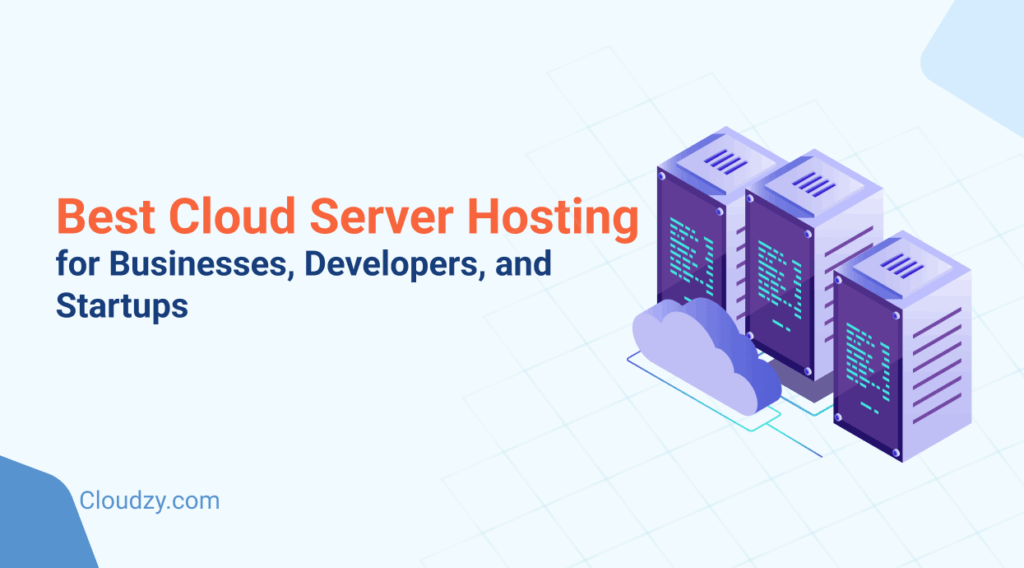the best cloud server hosting feels a lot like sifting through sand to find gold. So many companies promise the moon with their fast speeds, rock-solid security, and zero downtime. But which ones actually deliver? The truth is, good cloud and hosting solutions have completely changed how companies run their apps, store their stuff, and grow their operations without getting stuck managing physical machines.
Cloud servers work by spreading your resources across many physical computers. This creates a safety net that keeps working even if one server crashes. Small businesses love this flexibility. You can scale up when traffic spikes and scale down when things calm down. The cloud services market is experiencing explosive growth, with global revenues projected to quadruple from $721 billion in 2025 to over $2.7 trillion by 2034.
Whether you run a fresh startup or an established company, your hosting choice will either smooth out your operations or create endless tech headaches. This article looks at the top cloud server providers available in 2025, what makes each one special, where they fall short, and which businesses they serve best.
What Makes Great Cloud Server Hosting?
Let’s talk about what really separates the okay cloud-based service providers from the truly excellent ones. When you’re shopping around, pay attention to these factors:
Performance and Speed: How quickly your server responds directly affects your users’ experience. Look for companies using fast CPUs, NVMe/SSD storage, and data centers that minimize latency.
Reliability: Every minute of downtime costs you money and trust. Good providers promise at least a 99.9% uptime guarantee, with the best ones pushing to 99.99% or higher.
Scalability: Your hosting should grow as your business grows. The best options let you add more cloud resources without any service disruptions.
Security: You need protection against attacks, data breaches, and hardware problems. Look for providers offering DDoS protection, firewalls, regular backups, and strong encryption. With 80% of companies reporting increased frequency of cloud attacks in recent years, robust security features have become non-negotiable for businesses storing sensitive data.
Support Quality: When something breaks at 2 AM, fast and knowledgeable support becomes priceless. Look for 24/7 availability through chat, phone, and email with staff who actually understand technical issues.
Value: The cheapest plan rarely gives you the best value. Consider the whole package of features, performance, and support against what you’re paying.
Top Cloud Server Providers
The market for cloud and hosting has changed a lot over the years. Several providers now stand out with their own unique approaches. Each brings something special to address different business needs, from raw performance to budget-friendly options. Let’s look at who’s leading the industry and what makes each one right for specific situations.
Cloudzy
In the crowded space of cloud server providers, Cloudzy pulls ahead by delivering top-tier performance in every important category. Their high-frequency CPUs (4.2+ GHz) give businesses and developers computing muscle that most competitors simply can’t match.
They offer Linux VPS, Windows VPS, and RDP solutions with performance levels matched to specific tasks, from simple websites to complex development projects.
Key Features:
- Super-fast 4.2+ GHz CPUs in all plans
- NVMe/SSD storage for quick data access
- 10 Gbps network speeds
- Lots of bandwidth included
- Bitcoin and other crypto payment options
- You only pay for what you actually use
Best For: Companies that need stable performance, developers who want consistent resources, and Forex traders who require low-latency connections.
What really sets Cloudzy apart?
Their perfect balance of performance and reasonable prices. While other providers might stuff too many customers on one server or use outdated hardware, Cloudzy keeps high performing systems smooth even during busy periods. This makes Cloudzy ideal for businesses where performance problems simply aren’t acceptable.
SiteGround
SiteGround has built its name on fantastic WordPress support and customer service, making it a favorite for content creators and small businesses using web hosting services.
Pros of SiteGround
- Award-winning customer teams
- WordPress optimization and managed services tools
- Easy-to-understand plans
- Daily backups come standard
- Developer tools like staging and Git integration
Cons of SiteGround
- Higher starting prices ($100/month minimum)
- Fewer customization options than some competitors
Best For: WordPress-focused businesses, agencies managing multiple client sites, and anyone who puts support quality first.
SiteGround works best for WordPress users who want software as a service saas solutions without diving into complex technical settings. Their cloud infrastructure makes sites load quickly, but comes with a premium price tag that might not work for budget-conscious startups.
Cloudways
Cloudways offers something different by letting you pick your underlying infrastructure provider (like Google Cloud or AWS) while giving you a simplified management panel.
Pros of Cloudways
- Access to multiple cloud infrastructure companies
- Tools that developers will appreciate
- Flexible plans and pricing
- Solid security features
- You can choose how often to run backups
Cons of Cloudways
- No phone support options
- The interface can be tough for beginners
- No discounts for new customers
Best For: Developers who want flexibility in choosing their infrastructure without managing raw cloud instances.
What makes Cloudways special is how you can choose your underlying public cloud provider while keeping a consistent management experience. This creates a nice middle ground between public cloud access and fully managed services.
Liquid Web
Liquid Web serves users who need serious computing power, with options ranging from fully managed to completely unmanaged virtual private server setups.
Pros of Liquid Web
- Huge storage and bandwidth allocations
- 100% uptime guarantee
- Multiple management levels (from fully managed to DIY)
- Enterprise-grade solutions available
- 24/7 expert support teams
Cons of Liquid Web
- Too many options can overwhelm beginners
- Basic plans require costly add-ons to be useful
- Higher prices overall
Best For: High-traffic websites, resource-hungry applications, and enterprises needing custom configurations.
Liquid Web excels by providing dedicated servers performance with cloud flexibility. Their custom configurations work well for businesses with unique requirements that don’t fit standard hosting packages.
Hostinger
Hostinger has grown popular by offering affordable cloud hosting with surprisingly good features, making it accessible to startups and small businesses.
Pros of Hostinger
- Budget-friendly prices
- AI tools for site building
- Website builder included
- Email hosting for up to 100 accounts
- Free domain for your first year
Cons of Hostinger
- Traffic limits restrict growth potential
- No phone support available
- Long commitment required for the best prices
- No custom cloud options
Best For: Budget-conscious startups, small businesses, and personal projects.
Hostinger provides good value for those just starting with cloud and hosting, but traffic limitations make it less suitable for quickly growing businesses expecting major traffic increases.
ScalaHosting
ScalaHosting focuses on security while keeping prices competitive and features robust.
Pros of ScalaHosting
- Outstanding security tools (SShield)
- Unconditional money-back guarantee
- Fast customer service responses
- NVMe storage on all plans
- Custom cloud package creation
Cons of ScalaHosting
- Extra fee for cPanel
- No phone support
- Limited introductory discounts
Best For: Security-focused businesses and those who need reliable, fast customer service.
ScalaHosting’s proprietary SShield security system makes them stand out. It claims to block 99.998% of attacks while giving detailed reports on attempted breaches. This security focus appeals to businesses handling sensitive information.
| Provider | Starting Price | Storage Technology | Support Channels | Best For |
| Cloudzy | $3.96/month | NVMe/SSD | Chat, Email, Phone | Performance-focused businesses, developers, and Forex traders |
| SiteGround | $100/month | SSD | Chat, Email, Phone | WordPress-centric businesses and agencies |
| Cloudways | $14/month | SSD | Chat, Tickets | Developers wanting infrastructure choice |
| Liquid Web | $50/month | SSD | Chat, Email, Phone | High-resource businesses and custom needs |
| Hostinger | $8/month* | NVMe | Chat | Budget-conscious startups |
| ScalaHosting | $22.46/month** | NVMe | Chat, Email | Security-focused businesses |
- *With a 48-month commitment
- **With annual commitment
Industry trends show steady improvements in cloud reliability, with reported outages decreasing from 78% in 2020 to 60% in recent surveys, though choosing providers with strong uptime guarantee commitments remains critical.
Best Solutions For Specific Needs
Different businesses need different things from their cloud and hosting. The best provider changes depending on your company size, technical needs, and growth plans. Here’s a breakdown of the best options for various business situations, from established companies to brand-new startups.
For Businesses
Businesses care most about reliability, performance, and support quality. Cloudzy offers the best overall package for most business scenarios, with high-performing systems that stay fast even during heavy usage periods. WordPress-focused businesses might prefer SiteGround’s specialized optimization, while larger operations with custom needs could find Liquid Web’s flexibility more suitable.
The ability to scale resources up and down makes best cloud server hosting particularly valuable for businesses with traffic that varies throughout the year. Unlike traditional hosting, you only pay for what you actually use.
For Developers
Developers need environments that match production servers, support various technologies, and provide SSH access. Cloudway’s multi-provider approach gives developers freedom to choose their preferred infrastructure, while Cloudzy’s performance-focused plans provide steady computing resources for development and testing work.
For those working with machine learning applications or needing specific data center locations in certain regions, the Google Cloud integration through Cloudways offers specialized tools and global coverage. Some developers might also consider IBM cloud or Oracle cloud depending on their specific technical requirements. The mix of management simplicity and technical control makes these options particularly friendly to developers.
For Startups
Startups face special challenges: tight budgets, unpredictable growth, and changing technical needs. Hostinger offers the most affordable starting point for cash-strapped startups, but its traffic limits can become problematic once success arrives.
Many startups are also considering Alibaba cloud for its competitive pricing and expanding global market share. Cloudzy represents a smarter long-term investment for startups with growth plans, as its scalable infrastructure removes the need to migrate as traffic increases. The ability to start small and grow incrementally fits perfectly with typical startup growth patterns and cash flow realities.
Want a high-performance Cloud VPS? Get yours today and only pay for what you use with Cloudzy!
Get Started HereConclusion
When making your final decision, focus on providers offering strong uptime guarantee, performance-oriented hardware, and support teams with technical knowledge about your specific applications. The right provider should work like an extension of your own technical team, not just another vendor.




2 thoughts on “Best Cloud Server Hosting for Businesses, Developers, and Startups”
Hey just wanted to give you a quick heads up. The words
in your post seem to be running off the screen in Opera.
I’m not sure if this is a formatting issue or something
to do with internet browser compatibility but I thought I’d post
to let you know. The layout look great though!
Hope you get the problem solved soon. Many thanks
I’m amazed,I must say. Seldom do I come across a blog that’s both educative and engaging, and
let me tell you, you have hit the nail on the
head. The problem is an issue that not enough
folks are speaking intelligently about.I’m very happy I stumbled across this in my search for something regarding
this.